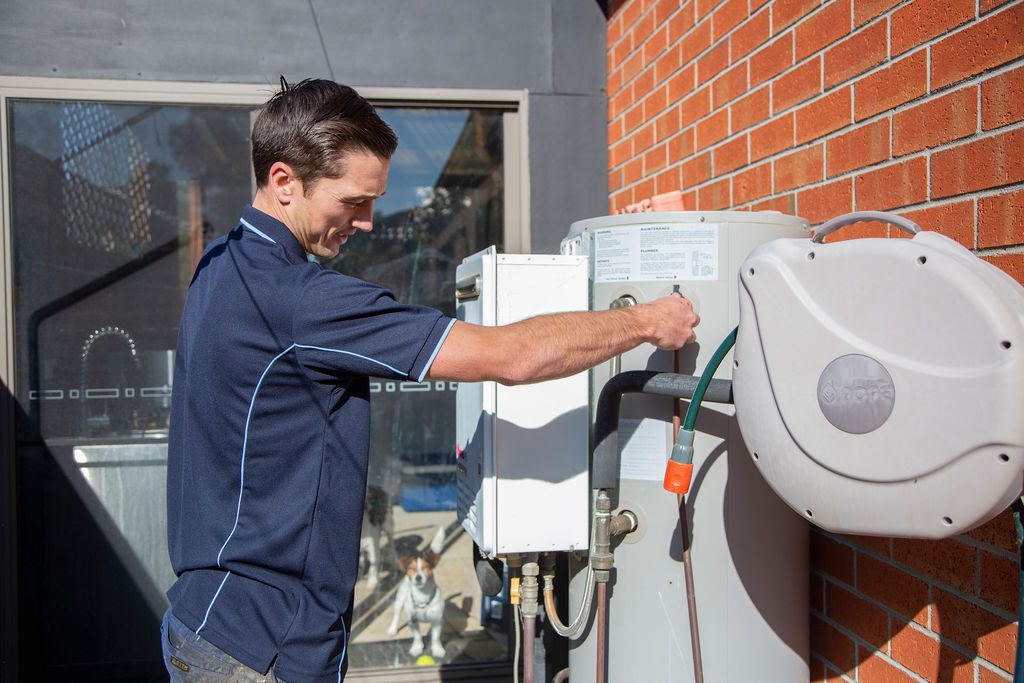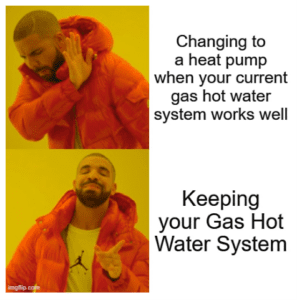Do I Need to Convert My Gas Hot Water System to Electric? Understanding the Victorian 2024 Gas Ban
It’s been two months since Dan Andrews and his Government announced, without consultation with the Master Plumbers Association I might add, that Victoria is taking immediate steps toward a sustainable future with the Victoria 2024 Gas Ban. His ambitious plan aims to transition away from natural gas and toward cleaner and more environmentally friendly energy sources.
What Is the Victoria 2024 Gas Ban?
The Victorian 2024 Gas Ban is a government initiative aimed at phasing out the use of natural gas in residential properties. Under this plan, new gas connections for heating, hot water, and cooking in new residential buildings will no longer be permitted starting from 2024.
What Does the Gas Ban Mean Going Forward?
The State Government of Victoria is aiming for the following with this gas ban:
- Cleaner Energy Sources: The gas ban is a crucial step toward reducing greenhouse gas emissions and combatting climate change. It encourages homeowners to switch to cleaner energy sources, such as electricity and renewable energy, for their heating, hot water, and cooking needs.
- Energy Efficiency: With the transition away from gas, homeowners have the opportunity to embrace energy-efficient appliances and technologies, which may lead to cost savings in the long run.
- Environmental Impact: Phasing out natural gas reduces the carbon footprint of residential properties, contributing to a more sustainable and eco-friendly future for Victoria.
Do I Need to Convert My Gas Hot Water System Now?
No, you don’t need to rush into converting your gas hot water system immediately. The gas ban applies primarily to new residential buildings. If your property is already using gas for heating, hot water, or cooking, you are not required to make an immediate change.
The alternatives to Gas Hot Water Systems are:
- Electric Hot Water Systems
- Solar Hot Water Systems
- Heat Pump Water Systems
How Long Will It Take for Victoria to Completely Cancel Gas?
The complete phase-out of gas in Victoria will be a gradual process. While the ban on gas connections for new residential buildings begins in 2024, it will take several years, possibly decades, to see a significant reduction in gas use across the state. Existing gas infrastructure will continue to be used until it’s no longer economically viable or until better alternatives are widely available.
If Banning Gas is For a Sustainable Future, Isn’t it a Good Thing?
- Banning Gas drives up the use of Coal powered electricity; in 2023, 68% Victoria’s electricity is derived from burning brown coal (more carbon polluting than it’s brother, black coal)
- Half of the energy in Victorian homes is powered by gas, converting these will put the electricity grid under immense pressure and cause potential load shedding (planned black outs)
- The State Government’s decision was criticised as being ‘knee-jerk’, without consultation with key stakeholders in the industry such as the Master Plumbers Association, and no consideration or exploration of alternative solutions
What are the Alternatives to the Current Energy Sources in Victoria?
As Victoria moves toward a gas-free future with the 2024 Gas Ban, it’s essential we explore alternative energy sources that can replace natural gas for heating, hot water, and cooking. Let’s take a closer look at some of the primary alternatives and discuss their pros and cons.
- Renewable Energy
Pros:
- Environmentally Friendly: Renewable energy sources like solar panels and wind turbines generate electricity without producing greenhouse gas emissions, making them environmentally friendly.
- Cost Savings: Over time, the installation of renewable energy systems can lead to significant cost savings on energy bills.
- Energy Independence: Homeowners who generate their electricity can become less dependent on external energy suppliers.
Cons:
- Initial Costs: The upfront costs of purchasing and installing renewable energy systems can be substantial.
- Intermittency: Solar and wind energy generation can be intermittent, depending on weather conditions, which may require energy storage solutions.
- Hydrogen Energy
Pros:
- Clean Fuel: Hydrogen is a clean-burning fuel that produces only water vapor when combusted, reducing greenhouse gas emissions.
- Versatility: Hydrogen can be used for a wide range of applications, including heating, electricity generation, and transportation.
Cons:
- Production Challenges: Producing hydrogen can be energy-intensive, often requiring reforming natural gas or electrolysis using electricity from non-renewable sources.
- Storage and Transportation: Hydrogen is challenging to store and transport efficiently due to its low density.
- Bio-Gas
Pros:
- Renewable: Bio-gas is produced from organic materials like food waste and agricultural residues, making it a renewable energy source.
- Reduced Methane Emissions: The production of bio-gas from organic waste materials can help reduce methane emissions from landfills.
Cons:
- Limited Supply: The availability of organic waste materials for bio-gas production may be limited, and collection and processing can be logistically challenging.
- Energy Intensity: The process of converting organic materials into bio-gas can be energy-intensive, depending on the feedstock and technology used.
- Uranium
Pros:
- High Energy Density: Uranium is an extremely energy-dense fuel, meaning a small amount can produce a significant amount of energy.
- Low Greenhouse Gas Emissions: Nuclear power generation produces minimal direct greenhouse gas emissions during operation.
Cons:
- Radioactive Waste: The disposal of radioactive waste generated by nuclear power plants is a long-term challenge, requiring secure storage for thousands of years.
- Safety Concerns: Accidents at nuclear power plants can have severe consequences, as seen in events like Chernobyl and Fukushima.
As Victoria explores alternatives to natural gas, a combination of renewable energy sources, hydrogen, bio-gas, and, in some cases, nuclear energy may play a role in the transition to a cleaner and more sustainable energy future. Each option comes with its own set of advantages and challenges, and the choice of energy source will depend on factors such as availability, cost, and environmental impact. It’s essential for homeowners and policymakers to carefully consider these alternatives to make informed decisions about the energy sources that will power Victoria’s future. Give us a call on 9931 0905 if you’d like to chat about your hot water system and gas alternative options.


